US Seeking Stronger Connections in Region Through Technology
The US State Department is fostering new methods of engaging directly with Latin American citizens.
On November 10, the Dialogue and Prospectiva Consulting co-hosted a discussion on the Brazilian government’s new innovation and technology policies. Originally designed to energize Brazil’s industrial development, the policies aim to raise its low productivity and lagging international competitiveness. Ricardo Camargo Mendes of Prospectiva Consulting and Otaviano Canuto of the World Bank offered their wide ranging opinions, while Andrew Rudman of PhRMA and Saulo Porto of IBM Latin America discussed challenges and opportunities for their specific companies under the new policies.
Despite an increased presence in the global market, Brazil’s new economic policy shows sign of protectionism and defense of traditional industries, argued Camargo Mendes. He referred to President Dilma Rousseff’s “Greater Brazil” policy, introduced in August 2011, contending, “it does not focus on promoting competitiveness.” Camargo Mendes argued that the lack of innovation and global competition will hinder the overall future of industrial growth and innovation.
In his analysis of Brazil’s policies, Camargo Mendes noted that the country has promoted industrial development since the 1950s, particularly under President Luis Ignacio Lula da Silva. He attributed Brazil’s stability during the 2008 recession and current crisis and strong growth performance to its long history of promoting industry. Canuto countered that more important than these previous policies is the investment and development of the BNDES, Brazil’s development bank.
In analyzing potential obstacles, Canuto argued that Brazil needs to tackle the middle-income trap so that social mobility is possible from middle to high income levels, and not just low to middle. Canuto emphasized Brazil’s need to avoid the Dutch Disease, or overreliance on commodity exports to the detriment of manufacturing.
Andrew Rudman argued that the creation of a domestic world class pharmaceutical industry in Brazil is possible given Brazil’s capital and resources. However, that goal requires focus on the education system, particularly in chemistry, a strengthening of ties between academia and the private sector, and more transparent regulations. The danger of technology transfers, Rudman argued, is that Brazil will be able domestically to produce current pharmaceuticals but will not have the domestic innovation required to create the next generation. In discussing IBM’s experience, Porto seconded the need for innovation in manufacturing and advanced technologies, noting the importance of government involvement in the business sector.
The US State Department is fostering new methods of engaging directly with Latin American citizens.
Throughout Latin America, a digital divide has emerged.
Despite clear differences in growth drivers and expansion rates, both regions need to improve city competitiveness and sustainability.
